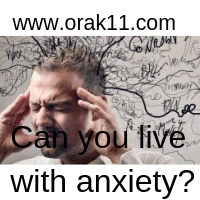
The heart beats faster in response to a stressful situation. Instead they sometimes sweat the palms when faced with a challenging task or event. Anxiety is a natural reaction of the body to stress. Several common examples of anxiety are listed below.
- First day at a new job

* Meeting the future spouse's family * Making presentations in front of many people One of the most important steps to overcome and manage concerns is to identify triggers. Everyone's triggers are different. Anxious people can identify triggers either on their own or with a therapist. If the trigger is present, it should be attempted to limit the exposure to the situation. Different coping techniques can be used if they are not limited. Triggers may take some time to identify. Meanwhile, there are things that can be done to relieve or calm concerns.
5 Quick Ways of Coping With Anxiety
If the concerns are related to an oncoming event, it is noticeable that the symptoms are short-lived and usually decreases after the expected event has occurred. There are some quick ways to control the situation if concerns are in the way of people's focal points or tasks.

anxiety
1-Question Your Thoughts
Negative thoughts may come from your mind. It is a way to challenge fear, to ask whether they are right and to see the points in which control can be addressed .
2- Take Deep Breaths
It is stretched to a place where it is felt as comfortable as possible and the eyes are closed and the eyes are only focused on the breath. After breathing in, hold it in 1 nefes2 seconds, then slowly out, breathing more slowly. The exercise should be repeated several times. Breathing will slow your heart rate to help calm down. Also Dr. By using the 4 da7 uygulan8 respiratory technique developed by Andrew Weil, anxiety can be reduced. While counting up to four in this technique, breathe calmly through the nose, while the lips are closed. The breath is held for seven seconds, and then is strongly removed by mouth for eight seconds. A new breath cycle is started again. This breath pattern can be applied four times and then gradually removed into eight breaths.

anxiety
3-Use Aromatherapy Fragrances
such as lavender, chamomile and sandalwood in the form of incense, wax or oil can be very comforting. Aromatherapine is thought to activate specific receptors in the brain and potentially alleviate anxiety.
4-Go for a walk or do 15 minutes of yoga: Sometimes the best way to stop anxious thoughts is to get away from the situation. Taking some time to focus on the body rather than on thoughts helps to resolve the concerns. It is comforting to do yoga if it is difficult to meditate or concentrate on it routinely. Regular exercise, balanced eating, sleeping enough and staying in touch with people who care about you are wonderful ways to prevent anxiety symptoms.
5-Write your thoughts: Writing things that worry you makes them out of your mind and makes them less intimidating.

anxiety
These ways that can help to cope, of course, should not be the only treatment method. Long-term strategies are needed to help reduce the severity of symptoms and even prevent them from occurring. Changing or supplementing the diet is definitely a long-term strategy. Research shows that some supplements or nutrients can help reduce anxiety.
These supplements can be:
- Lemongrass
- Omega-3 fatty acid
- Green tea
- Valerian
- Small amount of dark chocolate
However, it may take up to three months for your body to start taking advantage of these plants and foods. Drug users should consult with their doctor for herbal supplements.
When Is Anxiety Harmful?
It
may be difficult to identify what kind of concern is faced , because the reaction of a person's body to the perceived danger may be completely different compared to another. Initially felt manageable concerns may increase gradually within a few hours and become serious. Some of the common mental and physical symptoms of an anxiety attack are as follows: * Danger, panic or horror feelings * Irritability or restlessness * Fast heartbeats * Sweating * Chills or chills * Fatigue or exhaustion * Gastrointestinal problems * Difficulty in focusing * Hyperventilation Anxiety and panic attacks are also possible. The above mentioned quick coping strategies can help with panic attacks. When the quick coping tips are not working, you should go to a professional for help with concerns. A therapist can help develop ways to change negative thinking patterns and behaviors. If the concern is severe enough to require medication, different treatments are tried depending on the symptoms.
https://www.orak11.com/index.php/causes-of-anxiety-disorders/
Warning !
It is a proposal and Information article that has been compiled from different sources. There is no definitive diagnosis and treatment. Ask your doctor about any health problems. Remember, the treatment methods applied in health problems may vary according to the biology of individuals, hereditary characteristics, age, height, weight differences, allergic aspects and dozens of such conditions. Only your doctor can help you in the treatment of your health problems.
Posted from my blog with SteemPress : https://www.orak11.com/index.php/can-you-live-with-anxiety/